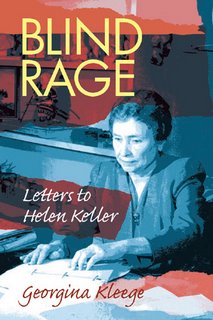Just reading of the "blogging news" can consume your life. But one of the bytes that penetrated my consciousness over holiday break was the prognostication that we have now hit a stabilization point for blogging. The point had been reached where the number of time-tested blogs fading out roughly equalled the number of blogs making their debut.
When Disability Studies, Temple University made its debut nearly 2 and 3/4 years ago with this
humble post, blogging just beginning to hit the big time, and a number of educators in disparate fields, but particularly in literary fields such as English, where turning to blogs as a way to reach a broader audience and to facilitate group work. Blogs chronicling the disability experience, let along the field of disability studies, were in their infancy. Much of the interchange in the field of Disability Studies took place through the medium of listserves. A tremendous amount of energy continues to be devoted to discussion on listserves such as
Disability-Research out of
Leeds, and
DS-HUM (Disability Studies in the Humanities) and SDS (open to members of the
Society for Disability Studies) in the United States, that operate as members-only clubs. The content of these often exciting and useful exchanges is lost to the much broader community of non-subscribing Disability Studies acolytes. In my own modest way, I set out to change that.
Perhaps the credit for getting DS,TU off the ground should go to Lydia Fecteau, an adjuct faculty member at
The Richard Stockton College of New Jersey : she created an excellent blog for her
Disability and Literature course that is still in our blogroll, and shared the interesting blogs created by students at her school. Or perhaps credit should go to a reference librarian here at Temple University,
Brian Schoolar, who started posting his news to a page directed at faculty in the College of Education. Brian gave me a lot of useful tips in the early days, and we conducted an initial training,
"Introduction to Weblogs and Blogging," for faculty, staff and students in the College of Education. Brian eventually discontinued the College of Education blog: I think he found his efforts to be a little bit premature, since faculty in our college were still largely unaware of blogs, and certainly did not subscribe to RSS readers.
Of course, the entire tone and feel of the blog changed soon after Penny Richards submitted her first post [Saturday,
Apr 16, 2005] and we got serious. Keep posted - we look forward to celebrating our 'anniversaries' later in the spring.
What triggers these reflections? In this month's
Disability Blog Carnival #7, Penny notes several comrades including
Gimpy Mumpy who have set their keyboards aside and directed their energies otherwise. And now word emerges that one of the post prolific bloggers of the past three years, Michael Berube, is
following suit. His blog archives will remain, but active blogging ceased as of Tue, Jan 9 2007. Fittingly enough, given the critical political tenor of many of his posts, Michael signing off with a YouTube with the famous atomic bomb finale from Dr. Strangelove, under the moniker
"I told you it was going to happen." Don't worry - we don't show any signs of flagging yet.





